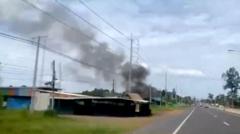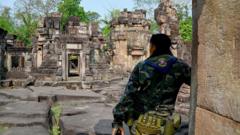Amid the backdrop of deadly clashes along the Thailand-Cambodia border, an intense social media battle is unfolding, illustrating the deep-rooted cultural rivalry that fuels tensions between the neighboring nations.
**Online Warfare Erupts Amid Rising Tensions Between Thailand and Cambodia**

**Online Warfare Erupts Amid Rising Tensions Between Thailand and Cambodia**
As territorial skirmishes escalate, social media becomes a battleground for national pride and rival narratives.
In recent days, conflicts at the border have resulted in significant casualties, prompting both governments to take action to avert full-scale war. However, a parallel "digital war" has emerged, as citizens engage in hostile exchanges online, defending their respective nations and narratives. Nationalistic sentiments have amplified, with comment sections on various platforms filled with heated debates.
Cambodian users took to TikTok and other platforms using hashtags like “Justice for Cambodia” and “Thailand opened fire,” while Thai users countered with accusations of Cambodia's aggression, such as a post urging support for the hashtag "#CambodiaOpenedFire". This virtual aggression has its roots in long-standing disputes over territorial ownership, historical grievances, and cultural pride that stretch back over a century.
Cultural sites, such as the contested Preah Vihear temple, have only intensified these nationalistic sentiments. As both nations lay claim to various cultural heritages—from traditional dance to cuisine—the rivalry has become entwined with political maneuvers. Tensions were further exacerbated after controversial incidents, including Thai athletes boycotting events seen as undermining their cultural practices.
Political leaders are also contributing to the hostile rhetoric online. Former Thai Prime Minister Thaksin Shinawatra engaged in a public spat with Cambodian leader Hun Sen, as both took to social media to criticize each other's political tactics amidst the ongoing strife. The fallout from an embarrassing political call leak involving Thaksin’s family added further complexity to the already volatile situation.
Despite calls for ceasefire, both the border clashes and the fervent social media exchanges show no signs of abating, highlighting the fragility of diplomatic ties as both nations grapple with their national identities against a backdrop of historical wounds.
As the conflict evolves, the concern for increased physical confrontations remains, urging both governments and citizens to reconsider the consequences of unchecked nationalism, particularly in the fast-evolving sphere of social media.
Cambodian users took to TikTok and other platforms using hashtags like “Justice for Cambodia” and “Thailand opened fire,” while Thai users countered with accusations of Cambodia's aggression, such as a post urging support for the hashtag "#CambodiaOpenedFire". This virtual aggression has its roots in long-standing disputes over territorial ownership, historical grievances, and cultural pride that stretch back over a century.
Cultural sites, such as the contested Preah Vihear temple, have only intensified these nationalistic sentiments. As both nations lay claim to various cultural heritages—from traditional dance to cuisine—the rivalry has become entwined with political maneuvers. Tensions were further exacerbated after controversial incidents, including Thai athletes boycotting events seen as undermining their cultural practices.
Political leaders are also contributing to the hostile rhetoric online. Former Thai Prime Minister Thaksin Shinawatra engaged in a public spat with Cambodian leader Hun Sen, as both took to social media to criticize each other's political tactics amidst the ongoing strife. The fallout from an embarrassing political call leak involving Thaksin’s family added further complexity to the already volatile situation.
Despite calls for ceasefire, both the border clashes and the fervent social media exchanges show no signs of abating, highlighting the fragility of diplomatic ties as both nations grapple with their national identities against a backdrop of historical wounds.
As the conflict evolves, the concern for increased physical confrontations remains, urging both governments and citizens to reconsider the consequences of unchecked nationalism, particularly in the fast-evolving sphere of social media.
















